【ACD2022 event report(summary)】
A future where Asia works together to eradicate malnutrition
8th Asian Congress of Dietitians (ACD2022)
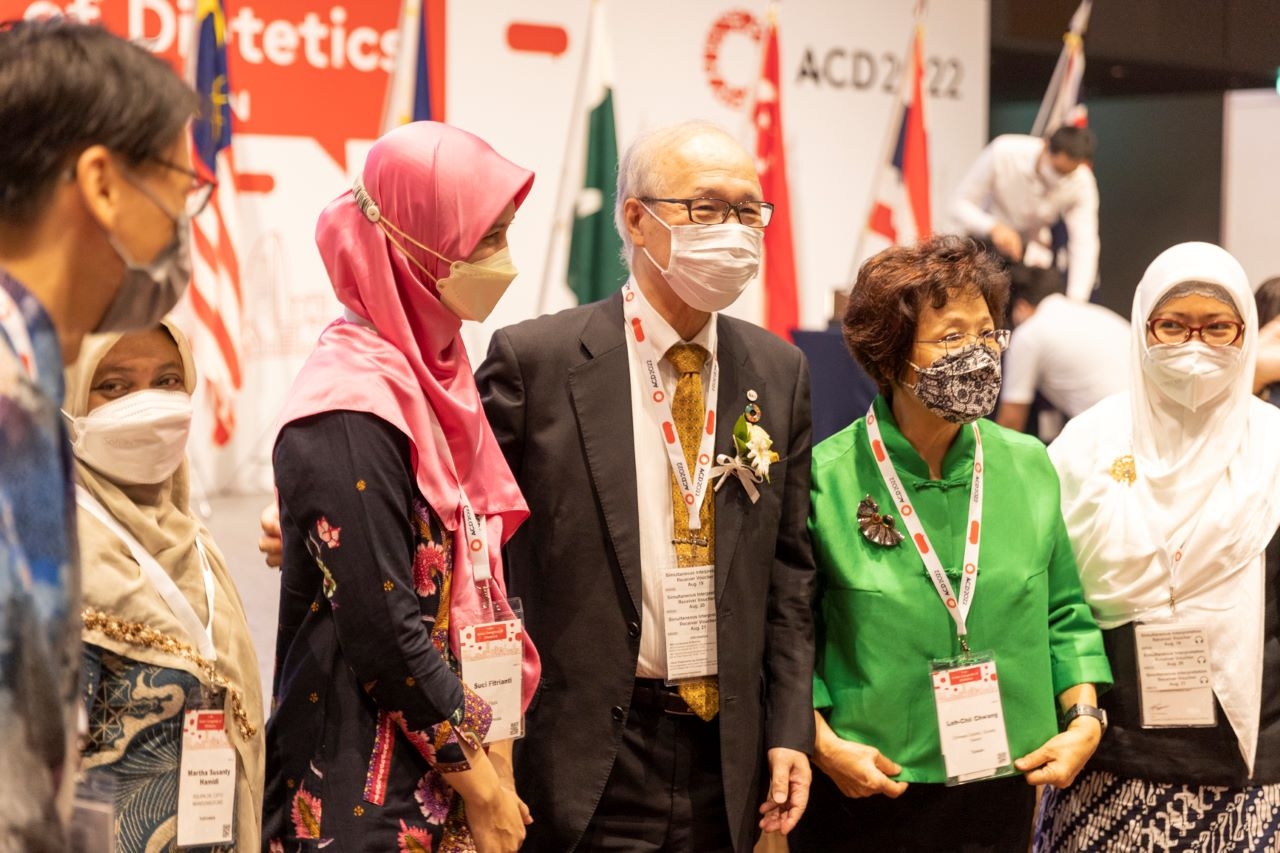
The 8th Asian Congress of Dietitians and Nutritionists (ACD2022) was held at Pacifico Yokohama, Yokohama, Japan, from 19-21 August 2022. Due to the Corona pandemic, many national and international scientific meetings and congresses were conducted online; however, it was possible to hold ACD2022 face-to-face.
The Asian Congress of Dietetic (ACD) is held every four years in one of the member countries of the Asian Federation of Dietetic Associations (AFDA), and this is the first time it was held in Japan. AFDA members include the Japan Dietetic Association, as well as the Dietetic Associations of Taiwan, Hong Kong, India, Indonesia, South Korea, Malaysia, the Philippines, Pakistan, Singapore, Thailand and Australia.
The theme of ACD2022 was "Towards a sustainable healthy society for a bright Asian future: addressing confusing nutrition information to solve contemporary issues". The conference brought together 1,137 dietitians, nutritionists and other nutritionists from Japan and 17 other Asian countries to discuss nutrition challenges, as well as measures and policies in their respective countries through 23 lectures, symposia and workshops, and 272 poster presentations.
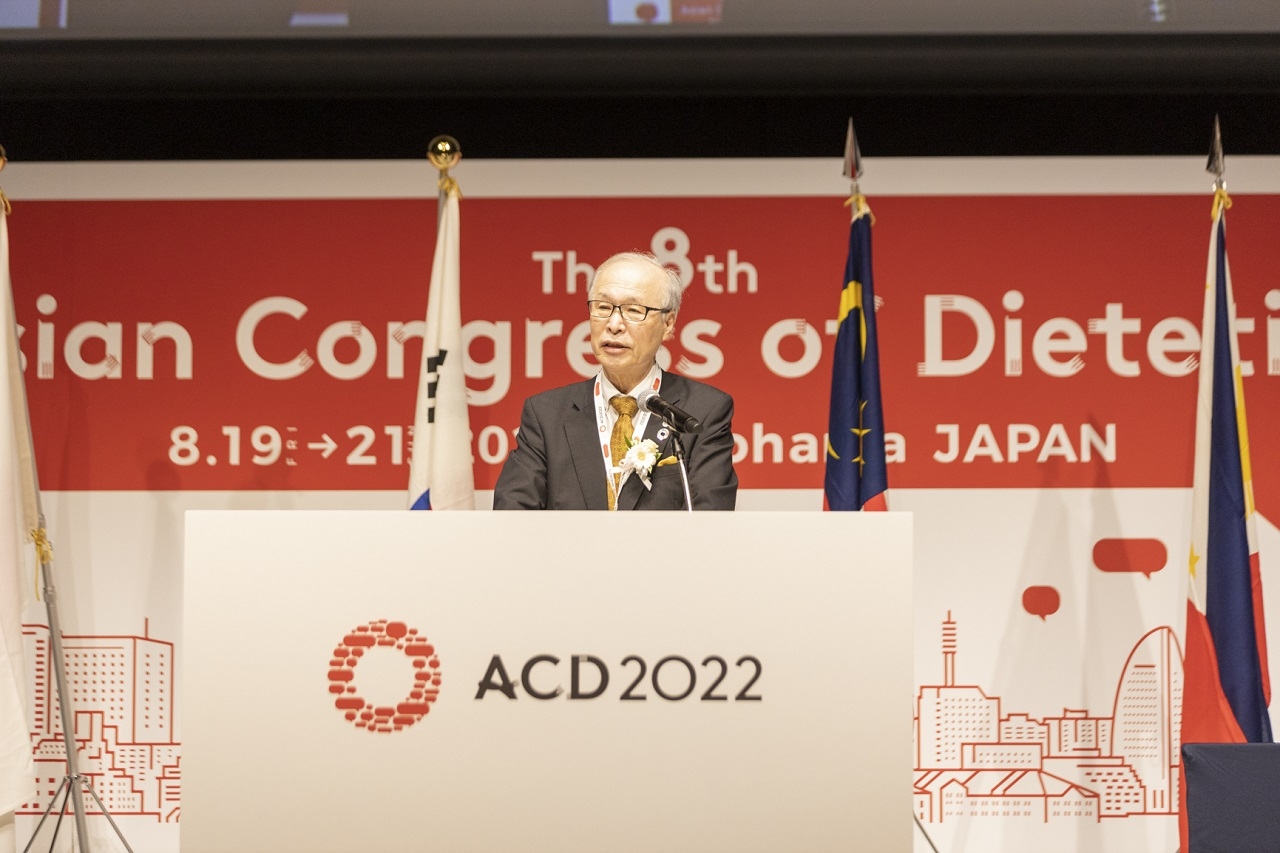
The ACD2022 opened with the soaring "I hereby declare the opening of ACD2022" by Ms Shihoko Suzuki, Vice-Chairperson of the Organizing Committee of the 8th Asian Congress of Dietitians (hereinafter referred to as the ACD2022 Organizing Committee).
At the opening ceremony, AFDA President Gordon Cheung, who was unable to visit Japan due to travel restrictions, sent a video message to the participants in the audience, encouraging them to enjoy the ACD2022 program and to develop friendships with other Asian dietitians.
In his opening remarks as organiser, Professor Teiji Nakamura, Chair of the ACD2022 Organizing Committee, said, “Ladies and gentlemen, welcome to Japan. We have been able to hold this congress. Nutrition is not only for health, but is also related to education, economics, gender, etc., and supports the sustainable development goals (SDGs) that are moving towards their realization around the world. Solving the double burden of malnutrition in Asia will require developing and deploying nutrition leaders in every corner of every country. Let's have a lively discussion over the next three days with the aim of making the people of Asia healthier and happier," he said in his opening remarks.
Guests of honor at the opening ceremony included Tokue Seino, Director of the Nutrition Guidance Office, Health Division, Health Bureau, Ministry of Health, Labor and Welfare, on behalf of Katsunobu Kato, Minister of Health, Labour and Welfare; Yuji Kuroiwa, Governor of Kanagawa Prefecture; Hirotoshi Shiro, Deputy Mayor of Yokohama City; Okami Tsukahara, Vice President of the Japanese Society for Nutrition Improvement; and Yoshihiko Takigawa, President of the Japan National Dietetic Training Institute Association, who was present to celebrate the opening.
At the awards ceremony held in conjunction with the opening ceremony, the Dr Chwang Leh-Chii Asian Dietetics Award was presented to Shigeru Yamamoto of the Japan Dietetic Association and Chanida Pachotikarn of the Thai Dietetic Association. The Dr Ching-Hwa Chiu Asian Outstanding Young Dietitian Award for young dietitians under the age of 45 was also presented to Ms Frankie Pui-Lam Siu of the Hong Kong Dietetic Society. Frankie took to the stage online and said, "My dream is to connect with and learn from other dietitians in Asia, and to put that back into advising patients. I believe that we as dietitians can create great power by outputting our knowledge and passion“.
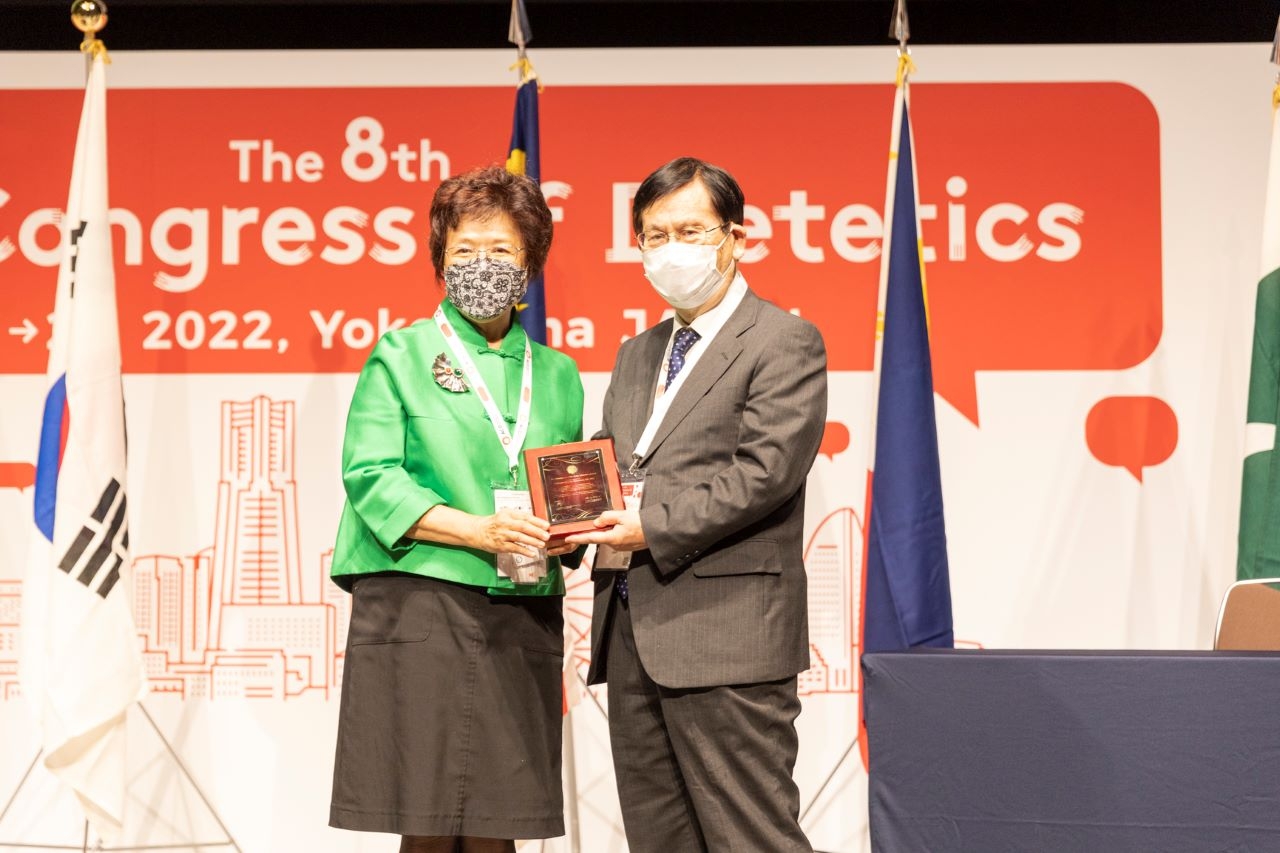
The impact of Japan Nutrition
In a special lecture entitled 'Japan Nutrition', Chairman Teiji Nakamura presented Japan's nutrition policy to date and the activities of dietitians. AFDA Honorary President Chwang Leh-Chii, who chaired the session, expressed his surprise when he explained that in 1926 there were only 13 dietitians in Japan, whereas today there are more than one million dietitians and nutritionists. He praised the fact that there are one million dietitians in the country, saying that it is first of all a great achievement.
Chairman Teiji Nakamura emphasized that Japan has continued to improve nutrition in a comprehensive manner based on nutrition education for the people by converting the food policy of the United States into a nutrition policy in Japan during the period of food shortages after World War II, implementing proper supply and distribution of food, and placing nutrition specialists in various institutions in Japan, including government, healthcare, schools, welfare facilities, companies, Self-Defense Forces, prisons and universities, etc. The Japan Dietetic Association (JDA) has been working to improve the nutritional quality of the Japanese people, and has been promoting the existence of Japan as a country with a long life expectancy. He added: "I am convinced that nutrition in Japan is sustainable, leaving no one behind and making healthy longevity possible. I believe that everyone in Asia agrees with me. Let us work more closely and amicably and contribute to Asia," he summarized, to which the audience agreed with loud applause. The speech was concluded by former Speaker of the House of Councilors, Akiko Santo, who, along with her congratulatory remarks, stated that she would do all she could to back the cause of improved nutrition in Asia.
Mutual learning and discussion of Asian "Dietetics"
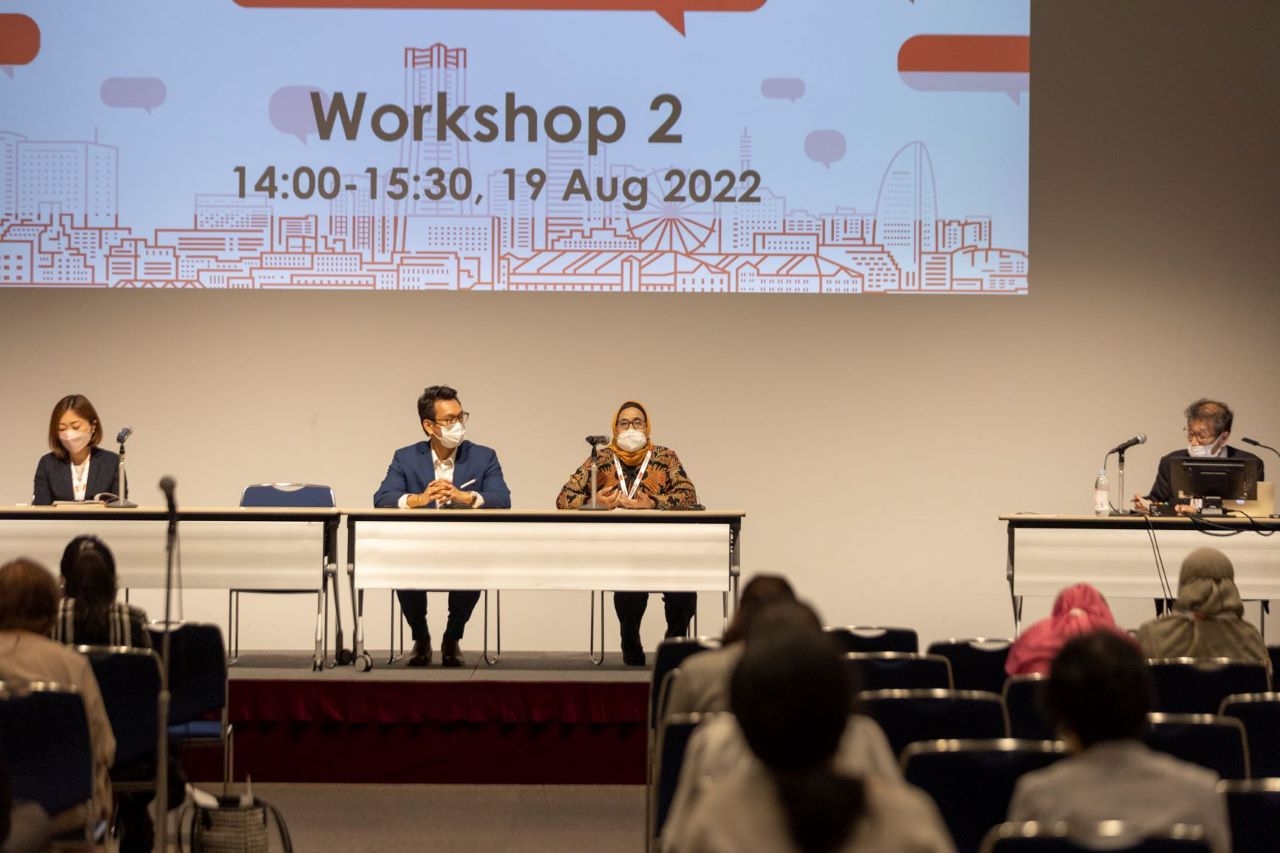
The three-day programmer consisted of one special lecture, two keynote lectures, four educational lectures, nine symposia and seven workshops with a total of 23 contents, covering a wide range of topics from diabetes, obesity, infectious diseases, frailty and sarcopenia in clinical and public nutrition to policies and systems such as disaster support, food service systems and nutritionist training, as well as a workshop where young nutritionists from different countries discussed their vision for future nutritionists.
One of the programmes, Workshop 2: Dietitian Activities in Obesity Control, featured speakers from Indonesia, Thailand and Japan, each of whom explained their country's policies and current situation, followed by a discussion involving audience participants. Miranti G. Sumapradja, an Indonesian dietitian, citing the Indonesian dietetic habits of heavy use of salt, sugar and coconut milk in cooking and a preference for fried foods, and the country's lack of parks and places for outdoor exercise, said, "There are about 50,000 professionals involved in nutrition, but dietitians are Only 10-15% of them exist, which is very small for a population of 170 million people. The government is trying to train more dietitians, and if there was one dietitian per 10,000 people, the current obesity rate of 21.8% could be reduced even further". He added that a cultural approach is also needed to combat obesity, noting that "in Indonesia, there is a practice where chubby infants are seen as being 'well looked after by their mothers'". Samitti Chotsriluecha, a Thai dietitian, also commented, "I am impressed that Japanese people, young and old, walk a lot. I think the fact that sweet food is also favored in Thailand and that there is little physical exercise is a factor in the increase in overweight, especially among middle-aged women", describing the current situation.
While the situation in various Asian countries was presented in various sessions, Chairman Teiji Nakamura spoke in Workshop 3: "Towards realising the commitments of the 'Tokyo Nutrition Summit 2021'", saying that "the word 'Dietetics' in the Asian Congress of Dietetics is difficult to translate into Japanese, as it includes not only nutrition, but also culture, economy and preferences. The time has come to disseminate 'Dietetics' from Asia, without relying on standards and guidelines from the West".
Poster presentations and exhibitions to deepen friendships
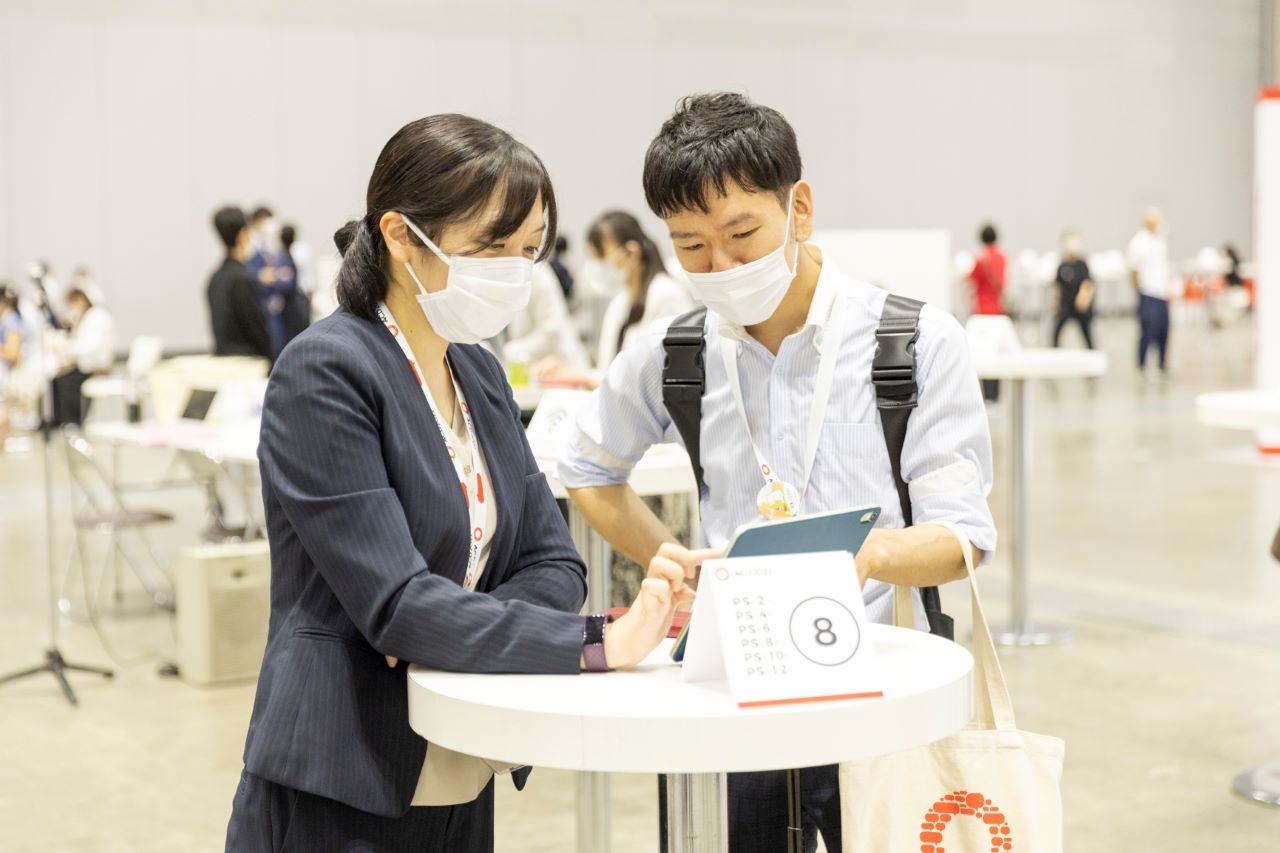
In the exhibition hall, 272 posters were presented, with presenters opening their laptops on the round tables provided and presenting their findings to the assembled participants. The posters were posted online allowing participants to view them from a distance on their own devices and communicate with the presenters via a chat room.
Also in the exhibition hall, Yakult Honsha Co Ltd, Ajinomoto Co Ltd, Meiji Co Ltd, California Walnut Association, "Rice Flour Gentle Swallowing Food" Consortium, Friesland Campina Institute, Hasegawa Chemical Industry Co Ltd, Kikkoman Foods Co Ltd, Nipun Co. Japan Sports Nutrition Association, and Nutrition Support Network LLC exhibited and promoted their initiatives to visitors. In addition, a variety of other 'hospitality' activities were offered, including a booth where visitors could easily experience the tea ceremony, a booth where they could relax with yoga, a photo booth where commemorative photos could be taken, a rest area and a drinks corner
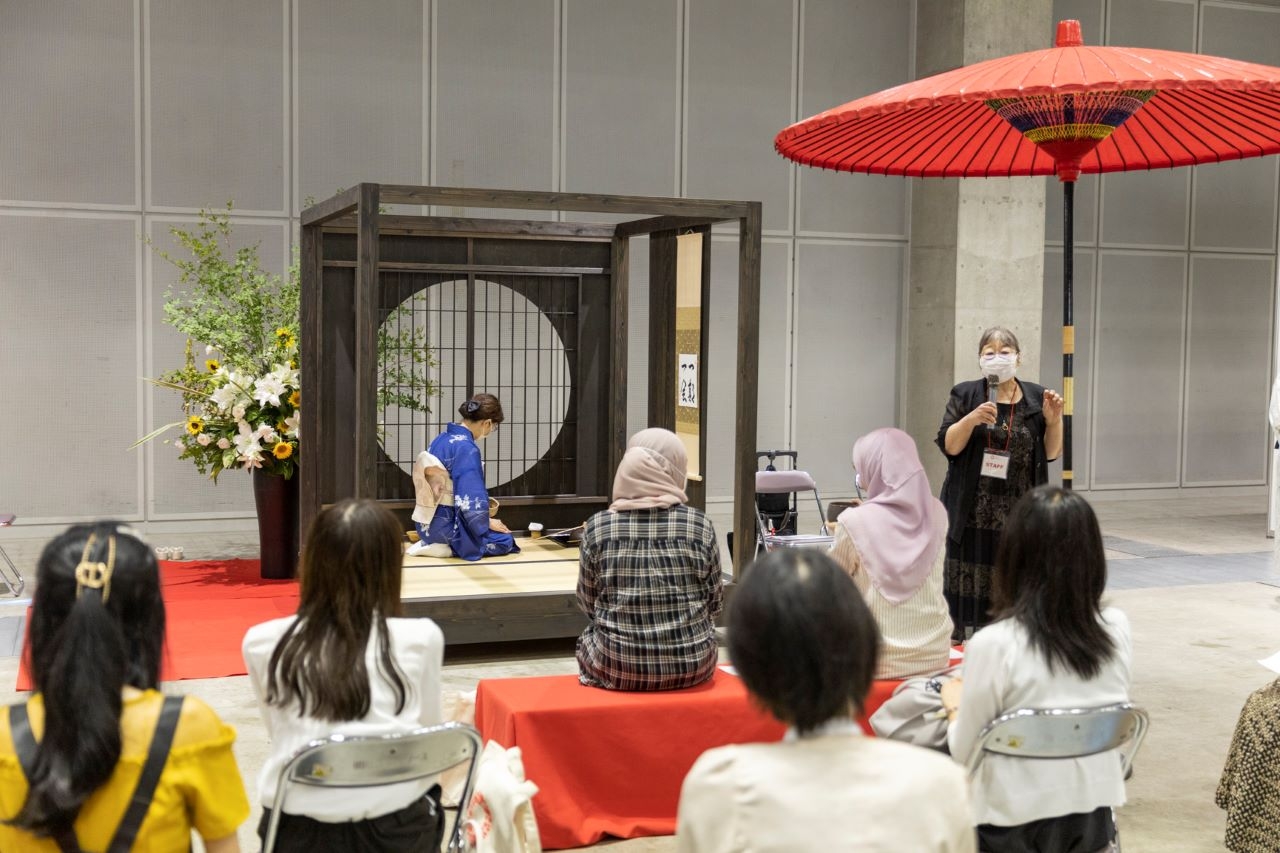
Signing of the Yokohama Declaration
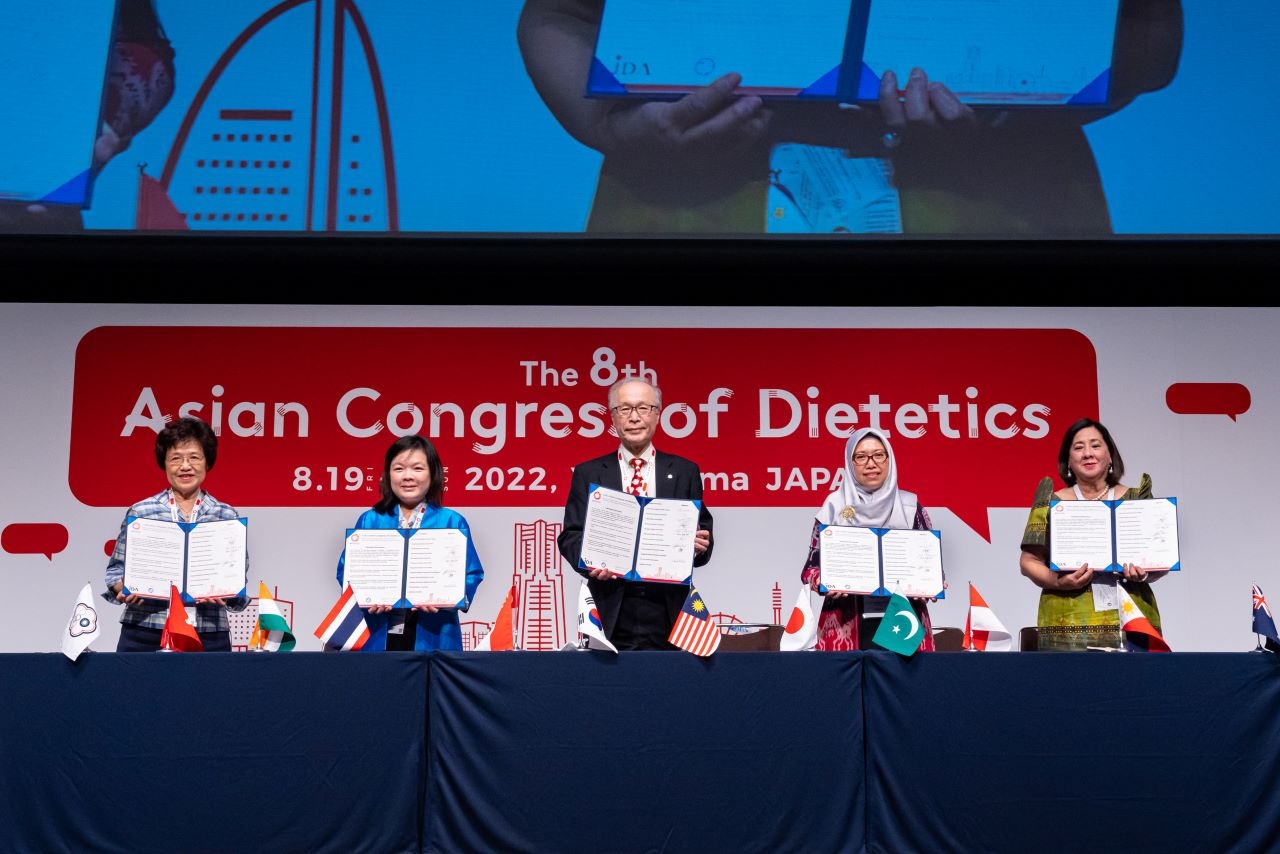
After three days of lively discussions and deepening their friendship, the dietitians from the different countries came to the closing ceremony on the 21st (Sun) with a sense of farewell. In his closing remarks, Chairman Teiji Nakamura thanked all those involved and continued as follows.
'One thing became clear during our discussions at ACD 2022. Of course economic and food aid is necessary to eliminate malnutrition in the world, but at the same time we need to educate and train professionals. There is a need to provide solid education for the profession and to increase public awareness of dietitians. Asia has the highest population growth and economic growth rates in the world. This has led to significant changes in dietary habits. It is necessary to share information and work together to solve problems across Asia. It is an achievement to have spent three days discussing this with each of you. "Making people healthier and happier through the power of nutrition" - see you again in India in four years' time.'
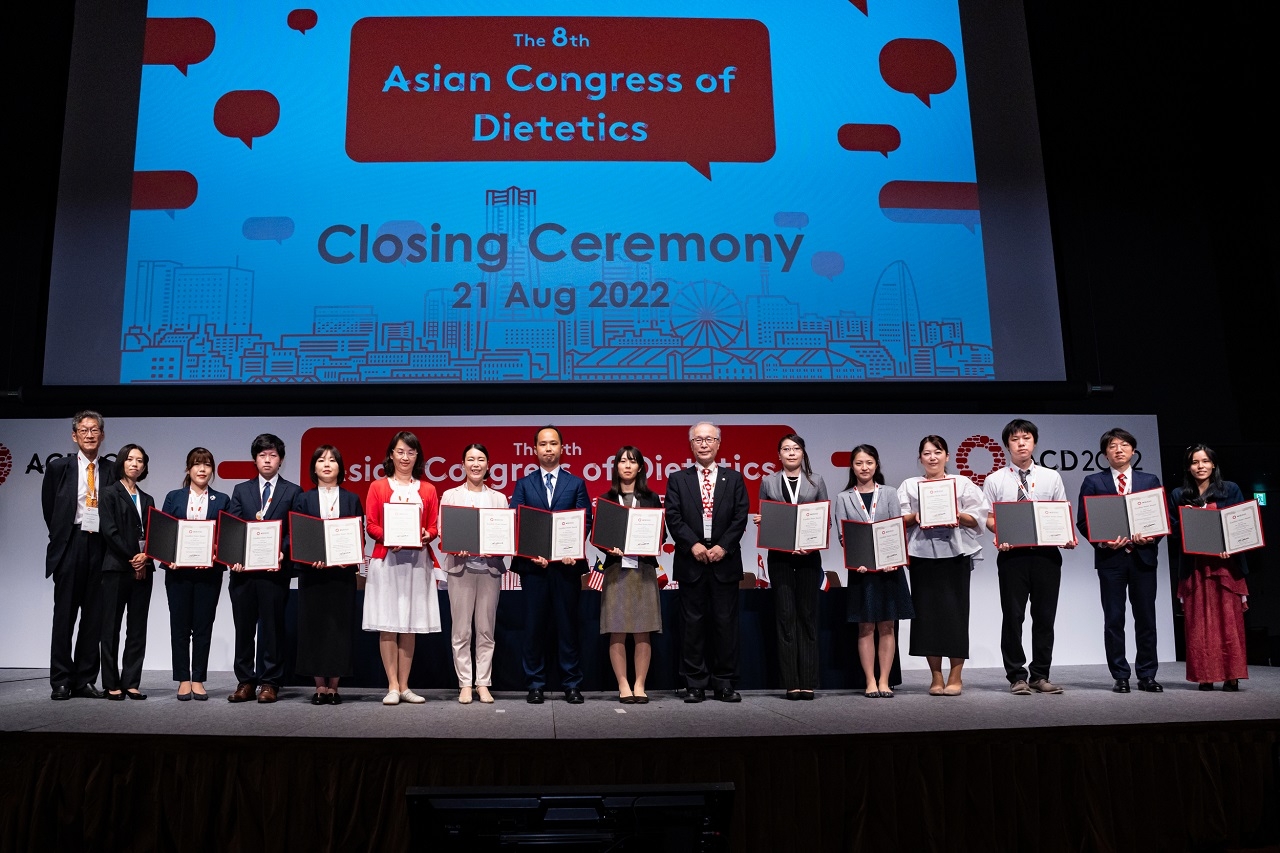
After that, Dr Yasuhiro Kido, Chair of the Executive Committee of the ACD2022 Organizing Committee, gave a summary of the number of participants and other details of ACD2022 and presented the Poster Awards. 13 presenters were recognized and Mr. Ying Qian Ong of the Malaysian Dietetic Association spoke on behalf of the winners and said, "Many people helped to make this research that has been recognized. I would like to send this award to everyone who helped us". The young award winners were all smiling and happy as they were presented with their awards on stage, symbolizing the bright future of nutritionists in Asia.
Furthermore, as an outcome of the congress, the ' Yokohama Declaration' was announced and signed on stage by the representatives of each country.
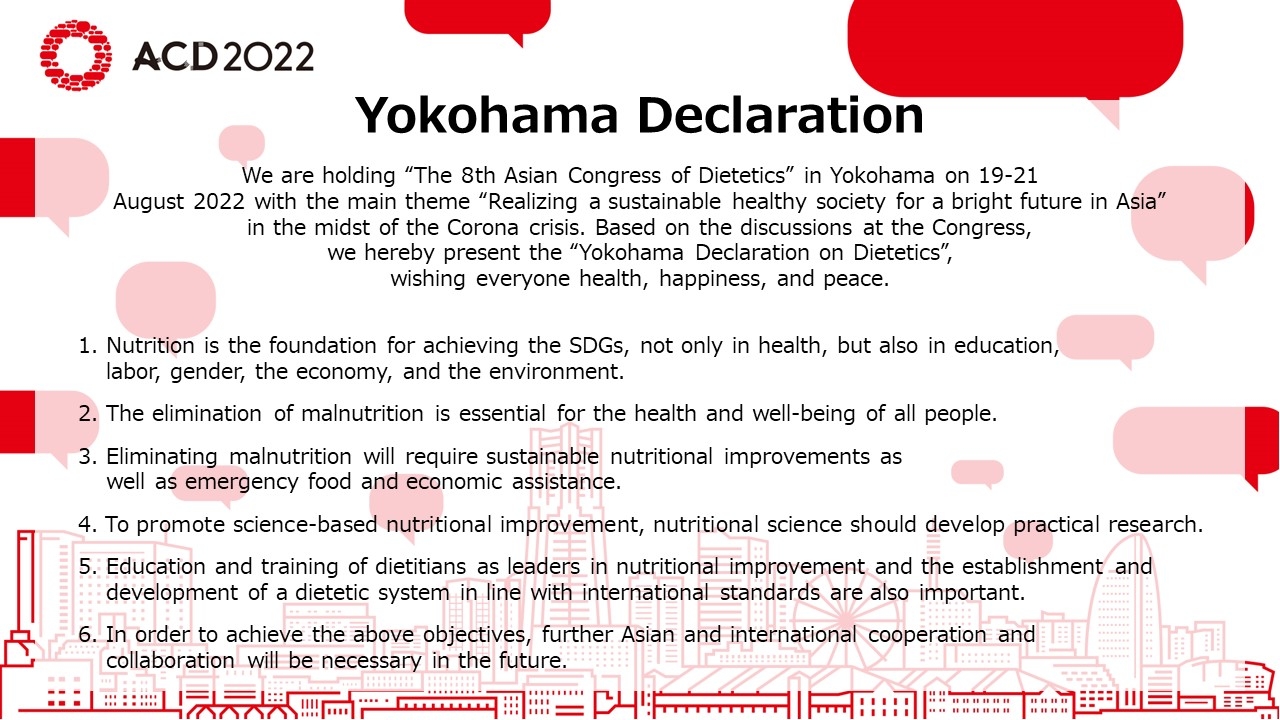
Finally, a video documenting the three days and a promotional video of the next host country, India, were shown. ACD2022 was then declared closed by Ms Toshiko Saito, Vice-Chairperson of the ACD2022 Organizing Committee.
As stated in the ' Yokohama Declaration', nutrition is fundamental to achieving the SDGs. Eliminating malnutrition is also essential for the health and well-being of all. At the AFDA General Assembly held during the ACD 2022 session, it was decided that Japan will be the chair country of AFDA from now until 2026 and that Dr. Teiji Nakamura President of the Japan Dietetic Association, will assume the position of AFDA President. As committed to at the Tokyo Nutrition Summit 2021, the Japan Dietetic Association will promote the "Training and deployment of food and nutrition professionals to build a sustainable nutrition improvement infrastructure", particularly in Asia. The mutual understanding and friendship with other countries fostered by ACD 2022 will be used as a driving force to develop new initiatives.

